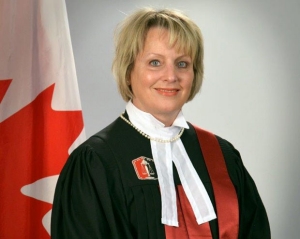So Andrea Paine, BA (journ. & poli. sci.) 85, admits that, after almost three decades bouncing between Quebec City, Ottawa and her native Montreal, it’s nice to put down roots in her hometown.
A former political aide, policy wonk, election staffer and communications guru, Member of Parliament’s chief of staff and political candidate, Paine is now coming to the end of her first term as a citizenship judge — a job she has found a special admiration for and that, for the first time in years, allows her to sit for the most part quietly behind a desk.
It’s a change from working in the higher reaches of provincial and federal politics — the career path she decided on after graduating from Concordia with a double major in journalism and political science. She says she saw the grim employment prospects facing journalism grads and decided to pursue a law degree at Université de Laval.
“When we graduated in ’85, there was a recession, and they told me I was too young-looking and that I’d have a hard time convincing people of things,” she says. “And there were no jobs for people that were starting, that’s for sure.”
Degree in hand, she began working for Yvon Vallières, who was the provincial minister of the Department of Fisheries and Sam Elkas, then Quebec Minister of Transport. She then returned to Montreal to help Jean Charest’s leadership run for the Progressive Conservative of Canada (PC) in 1993.
Paine ran as a PC candidate in Montreal’s West Island in the 2004, 2006 and 2008 elections before moving to Ottawa as a Conservative Party of Canada staffer for cabinet ministers such as Rob Nicholson and Leona Aglukkaq.
As a working mother of three girls operating at the highest level of government in the country, Paine appeared to have it all. Until it almost came crashing down in April 2007, with a breast cancer diagnosis.
It was a rough go. She had a lumpectomy, then a double mastectomy and a reconstruction. The 10-1/2 hour surgery was mostly successful, but her doctor also wanted chemotherapy treatment to make sure.
“But I kept working,” Paine says. “I had chemo on Thursday morning, so I’d have Thursday and Friday off and by the time Sunday came around, I was out of the worst — you really go into this dark hole when you’re doing chemo.” She would return to work on the following Monday.
With chemo every two weeks, she describes the 16-week treatment as the worst experience of her having cancer. The good news, however, is that the cancer has not come back. She is still going in for a checkup and blood tests every six months.
“I tend not to dwell on it,” she says. “Well, I think I dwell on it a little just before I go in for my next appointment, but once it’s done, I don’t dwell on it.”
Paine credits her recovery with having being in excellent physical condition at the time of her diagnosis. She’d been training for a half-marathon and believes that made all the difference, both after her surgery and during chemo.
Those two pillars of her life — running and breast cancer — shape her blog, lifepowerblog.ca. “I hope I’m inspiring people — breast cancer patients and survivors, and their caregivers,” she says.
“I try to highlight the importance of exercise and other things. I meditate every day now. It’s a huge stress-reliever, and it’s probably better for you than many of the pills people can take.”
Paine remains active in discussing breast cancer and raising awareness for breast cancer research. “What I would suggest to people is, listen to your body, listen to what’s best for you,” she says.
“Things change enormously once you’ve been diagnosed with cancer. Once you’re a cancer survivor, you look at life through a different lens. And you probably don’t take as much for granted anymore.”
#CUalumni
Related links
 Andrea Paine was appointed a Citizenship Judge for Montreal in June 2013
Andrea Paine was appointed a Citizenship Judge for Montreal in June 2013